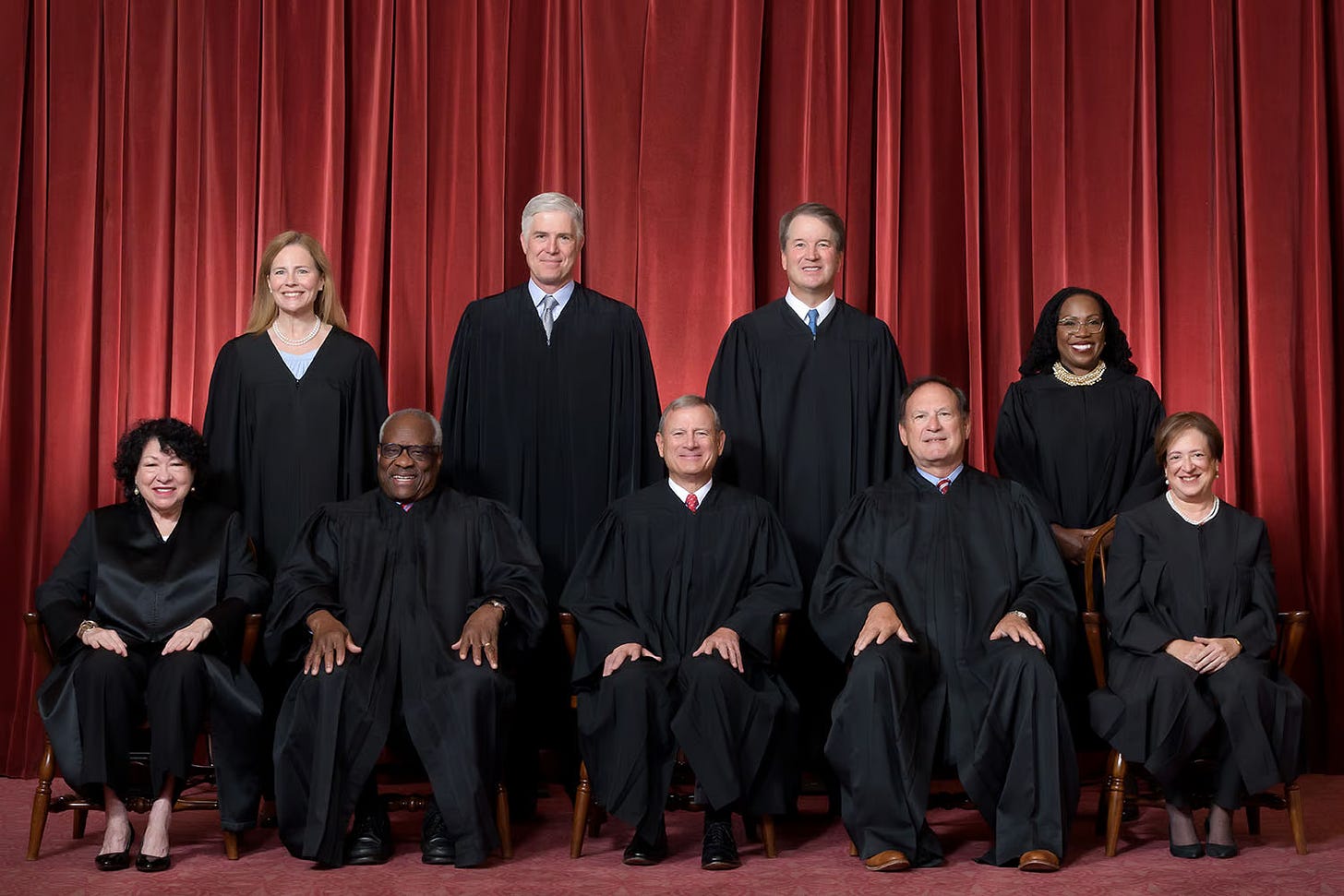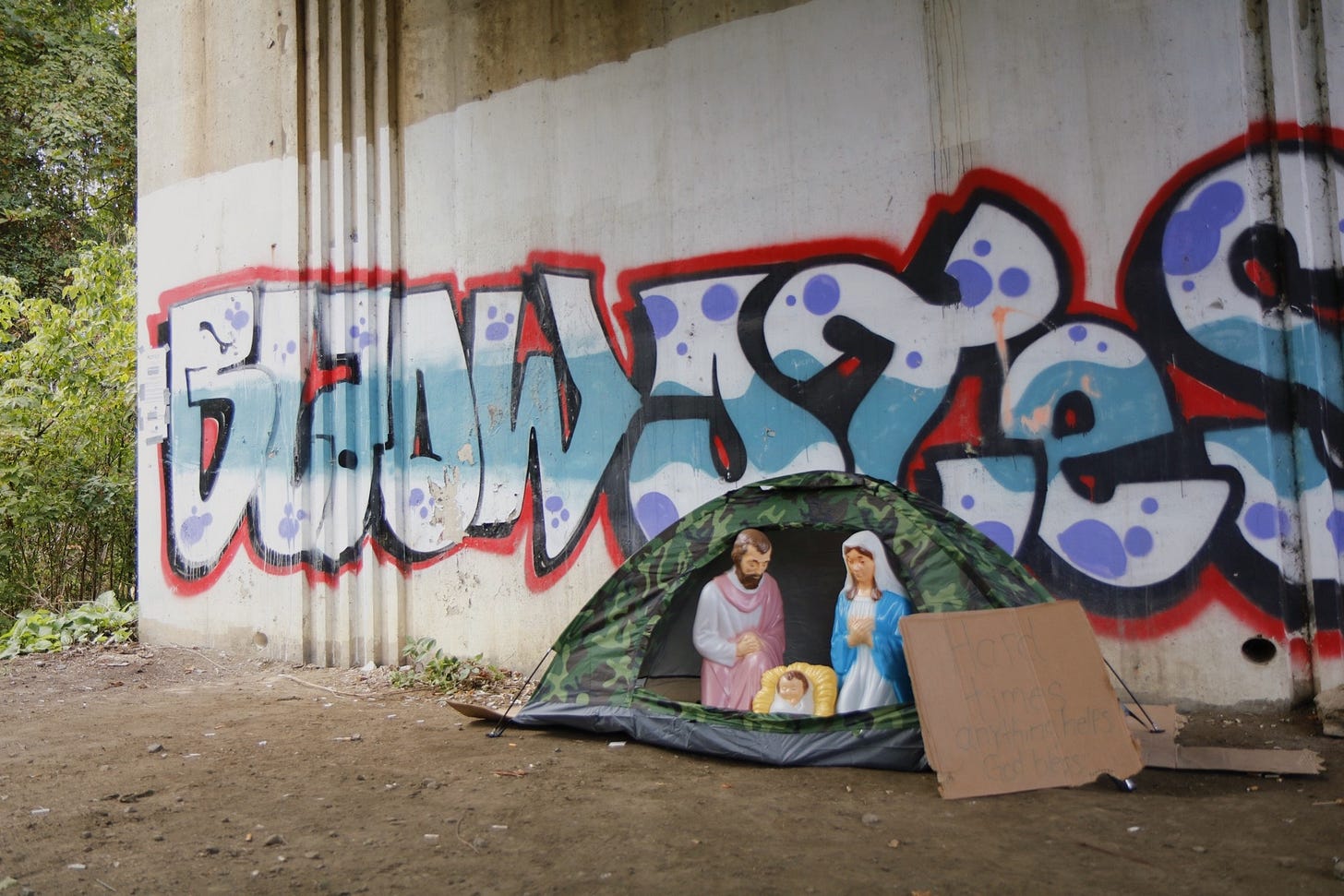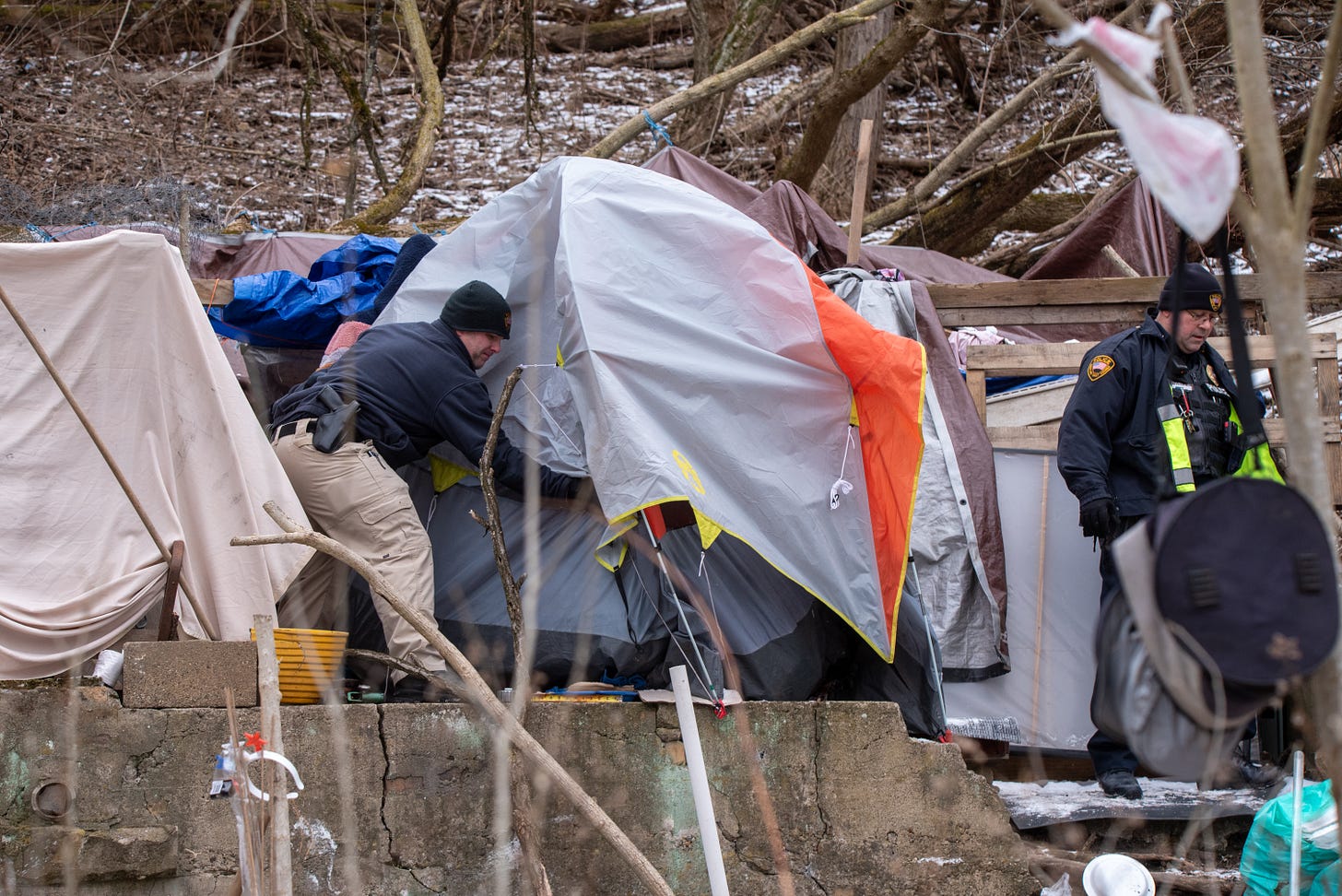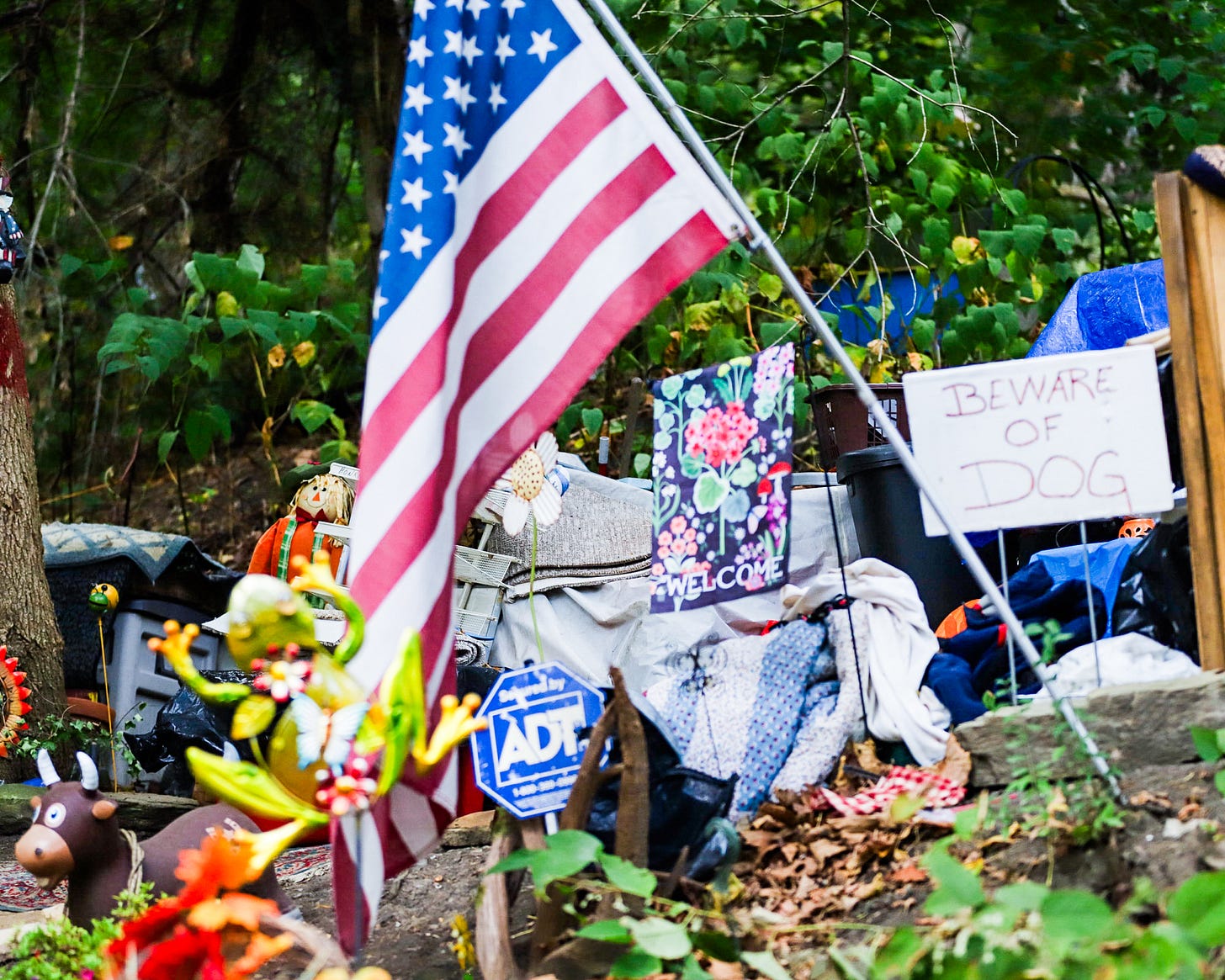"Stay awake or be arrested." SCOTUS greenlights criminalizing homelessness
In a landmark decision, the conservative Supreme Court majority ruled that city’s can fine and jail people for sleeping outdoors on public property whether or not they have access to shelter.

WASHINGTON, D.C. — The Supreme Court of the United States delivered a six to three decision on Friday in City of Grants Pass v. Johnson that effectively greenlit the criminalization of homelessness. The conservative supermajority ruled municipalities have the authority to ban sleeping on public property and levy fines or jail time to those who violate said bans.
Grants Pass Municipal Code §5.61.030 bans all urban camping on public property, with limited exceptions by the City Manager or by Council proclamation. Those in violation of the code will receive a 24-hour notice to vacate, at which point the person's dwelling will be destroyed. Municipal Code §6.46.090 prohibits people from parking their cars at city parks “for the purpose of camping” for more than two hours between the hours of 12:00 a.m. and 6:00 a.m.
Violation of the bans on sleeping or car-camping on public property would result in a warning for first-time offenders, a fine and no-trespass order for second-time offenders, and 30 days imprisonment for each consecutive charge afterwards. Effectively, the City of Grants Pass made it illegal to be homeless in the city.
This case originated in 2018 when the Oregon Law Center filed suit against the City of Grants Pass, Oreg., seeking to block several city ordinances banning sleeping on public property and overnight parking of cars at area parks. At the same time the U.S. Court of Appeals for the Ninth Circuit ruled in Boise v. Martin that cities could not enforce public camping bans without adequate “practically available” shelter beds. In 2022, the Ninth Circuit extended its Boise decision to Grants Pass.

That all changed Friday when the Supreme Court’s six conservative justices overturned Boise v. Martin. Justice Neil Gorsuch, a Trump-appointee, authored the Court’s majority opinion. In it, he argues that penalties related to camping bans are not cruel and unusual because they are “not designed to superad[d] terror, pain, or disgrace.” Gorsuch says there is no difference between penalties for camping bans and penalties for other criminal offenses.
The crux of the argument revolved around where sleeping in public is a status, or person’s characteristic. Plaintiffs requested the Court extend Robinson v. California to homelessness. In that case, the SCOTUS ruled California could not create a ban having an addiction.
The Court in City of Grants Pass v. Johnson refused Plaintiff’s request with Gorsuch saying “public-camping ordinances do not criminalize status.” Rather, he says they prohibit “action undertaken by a person, regardless of status.” Meaning, in essence, the Court’s majority does not believe the ordinance targets homeless people specifically.
Writing in dissent for the Court’s liberal justices, Justice Sonya Sotomayor calls that notion a “fantasy.” She quotes the deputy chief of police for Grants Pass who, in 2019, acknowledged that he was not aware of “any non-homeless person ever getting a ticket for illegal camping in Grants Pass.” Further, the deputy chief of police testified in Court proceedings that, essentially, only a person sleeping in public without “another home to go to,” they will be cited.

The Court acknowledged that there are not enough shelter beds in Grants Pass. Gorsuch notes the city is home to 38,000 people with an estimated 600 people experiencing homelessness on any given day. He also acknowledges that the only shelter in town has low capacity, and does not count as “practically available” due to its rules mandating clients attend their church services. Despite that, the Court still ruled Grants Pass can fine and arrest their homeless population.
Sotomayor blasted the Court’s conservative majority in a lengthy dissenting opinion. In it, she says “sleep is a biological necessity, not a crime. For some people, sleeping outside is their only option.” As mentioned, Grants Pass does not have the shelter capacity for all their homeless. “For people with no access to shelter,” Sotomayor says, “[the city’s ban] punishes them for being homeless.”
And officials in Grants Pass acknowledged their goal was to punish the homeless. In a City Council meeting discussing the ban, members were quoted saying they needed to “identify solutions to current vagrancy problems.” The City went further, with “previous efforts to banish homeless people by ‘buying the person a bus ticket to a specific destination,’ or transporting them to a different jurisdiction and ‘leaving them there.’”
Sotomayor argued the only question before the Court in City of Grants Pass v. Johnson was whether people who have no access to shelter could sleep on public property. “Instead, the majority focuses almost exclusively on the needs of local governments and leaves the most vulnerable in our society with an impossible choice: Either stay awake or be arrested.”
Sotomayor notes that criminalizing homelessness “can cause a destabilizing cascade of harm” preventing people from “regaining housing, obtain employment, or access needed treatment.” Further, the dissent cites the fact that items destroyed during camp closures and sweep include “personal documents needed for accessing jobs, housing, and services such as IDs, driver’s licenses, financial documents, birth certificates, and benefits cards; items required for work such as clothing and uniforms, bicycles, tools, and computers; and irreplaceable mementos.”

In fact, this exact situation occurred in Wheeling, W.Va., when the city’s administration ordered the destruction of several homeless camps in East Wheeling during a winter weather emergency. At least one person—who was working at the time of the sweep—lost his birth certificate. Another couple lost all their property saved after losing their home to foreclosure.
At the end of her opinion, Sotomayor lambasted the majority. “[Their] framing of the problem as one involving drugs, diseases, and fires instead of one involving people trying to keep warm outside with a blanket just provides the Court with cover to permit the criminalization of homeless people,” Sotomayor writes.
Technically, this decision is limited to the Ninth Circuit. In practice, though, this decision has wide reaching effects. The entire West coast of the United States is now free to penalize their homeless communities simply for being homeless—and municipalities do not need to do anything to help their most vulnerable citizens.
It is not hard to imagine this causing a mass exodus of homeless people forced to move from city to city in search of refuge. Those who choose to stay where they live—often where they were born and raised—will face criminal records that only stymie their ability to escape poverty.
Now that the Supreme Court has made this decision, it’s unlikely bans in other circuits will be challenged. And it is possible bans become increasingly more punitive. If 30 days in jail is not cruel and unusual, is six months? A year? What is the upper limit for fines and jail time—if there is one?

On any given night, half a million Americans are homeless. They are in these situations for a variety of reasons, including, as Sotomayor writes, “crippling debt and stagnant wages, domestic and sexual abuse, physical and psychiatric disabilities, rising housing cost with declining affordable housing options,” among other causes. This all occurs in the richest nation on Earth…the freest nation on Earth…the best nation on Earth.
One of the greatest shames of the modern United States is its treatment of the least among us. While an extreme minority of the population enjoys a lavish life of ease and comfort, hundreds of thousands sleep on streets and in gutters. Many millions more sit at a precipice, just one missed paycheck from a similar fate. We must do better as a nation.

